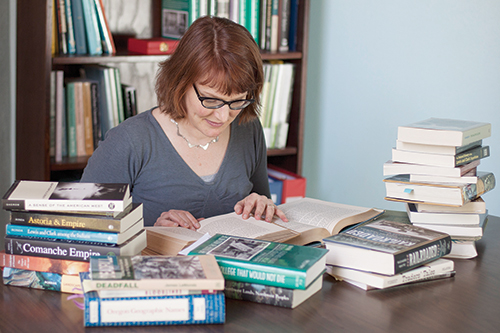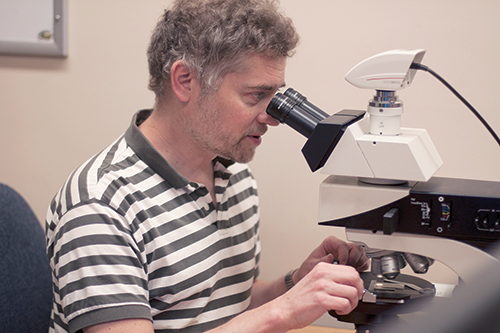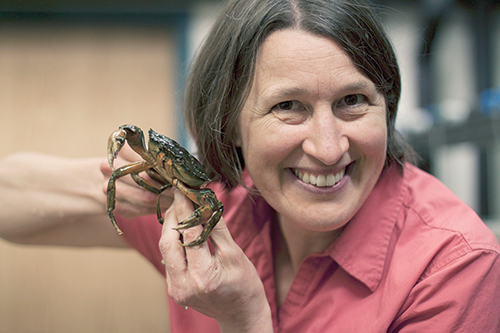Meet Professor Katy Barber, associate professor of history.

Vanguard: What is a geek to you?
Katy Barber: Not me! (Laughs.) Someone who is intensely passionate about something that is not shared by the majority of other people.
VG: Following that, were you a geek growing up?
KB: I was thinking about that, and thought: Of course I’m not a geek, but was I a geek growing up? Yeah, I guess so, because I really liked to read. I don’t know. I was not a good historian as a kid. I loved literature. I guess in that way I was geeky, because I liked to read things that were above my grade level—significantly. I loved to talk about books. I remember one time in German class I was reading Gone with the Wind in the back of class in fifth grade, and my language teacher called me out and told me that I wasn’t supposed to be reading in class. When I hung out with my best friend, I spent a lot of time reading while she watched TV.
VG: What led you to where you are today?
KB: Inevitably, reading led to questions of history. I read the newspaper when I was a kid. I had conversations with my parents about what was going on in the newspaper, and that often led to historical questions. So in some ways I didn’t realize…I was engaged in intellectual pursuits and loved it. I think some of it is finding your peer group. I certainly did in graduate school. It’s prized to be that geeky. Becoming an academic is kind of like you’ve won the lottery of geekiness.
VG: Do you still consider yourself a geek?
KB: I have the same intellectual interests as I did when I was a kid, and I have friends now who have the same interests, or similar interests, and we spend an awful lot of time talking about them. I have a standing Sunday morning walk with somebody, and we do talk about our families and we occasionally gossip, but mostly we talk about our work, which I think is probably the ultimate of geeky—to do it in
your off time.
VG: Star Wars or Star Trek, or other?
KB: Firefly!
Meet Alex Ruzicka, professor of geology.

VG: What is a geek to you?
AR: Somebody who gets involved in technical things quite a bit more than the average person.
VG: Following that, were you a geek growing up?
AR: Yes. I was definitely not doing the normal things that [other] people were doing with their lives. I never got into sports, but I did like to look at technical reports, like the ones that were coming back from the Apollo moon landings. I thought it was so cool that we could go to another body, we could explore, we could pick up some rocks, we could learn about the origin of the body. I thought, “That’s neat.”
VG: What led you to where you are today?
AR: I was always kind of interested in space exploration and thought, “Maybe I want to become an astronaut,” and then I realized, no, I’m not really much of an engineering person. I started in college, taking an aerospace major at the University of Minnesota, and I quickly learned that that stuff is dull as dishwater. Some geeks might like that stuff; I didn’t like that. So, what is it that I’m really liking? I like space exploration, I really like learning about the bodies, like the moon and the rocks, and [I] thought maybe I should learn more about the rocks part. So I started going into geology, and said, wow, plate tectonics—the Earth actually does this? How cool is that? Finally I said, what about rocks in space? Then it just snowballed into meteorites and planetary bodies.
VG: Do you still consider yourself a geek?
AR: No, because what I do now is consistent with my profession. Now, I can go to a conference and that’s what people do, they study the rocks from space and we can talk to each other. We’re colleagues. So I don’t feel like I’m unusual, because that’s my job now.
VG: Star Wars or Star Trek, or other?
AR: Both and other. I liked Enterprise, and the first one, but for different reasons. Enterprise reminds me of me in a way, because of how we want to venture into space and the exploration [of it]. Also, I think the acting was really good and the story was really good. The first one was good because they dealt with big themes and there was a lot of symbolism. I’m getting my kids to watch it now, but they aren’t quite there yet because it’s at a higher level.
Meet Professor Catherine deRivera, associate professor of environmental science.

California, San Diego. Photo by Miles Sanguinetti.
VG: What is a geek to you?
CD: Someone who gets very excited about their discipline, or maybe even video games or Dungeons & Dragons.
VG: Following that, were you a geek growing up?
CD: Yeah, I was, a bit. I’ve always had really diverse interests. I get really excited about things, but I get really excited about a lot of things. So I don’t just identify with one thing, which allowed me to hang with the popular kids and the jocks as well. I liked a lot of sports as a kid, acting, crafts and art.
VG: What led you to where you are today?
CD: Sports were important…I started off as a long-distance runner and you have to be pretty disciplined for that, [which is also] pretty important in academics. I also spent a lot of time outside, checking things out. My family has this island in Maine that I got to spend every summer on. I spent a lot of time in the intertidal zone, and not surprisingly I’m a marine ecologist [now]. And the crabs that lived there are the European green crabs that I study.
VG: Do you still consider yourself a geek?
CD: Yeah. Pretty hardcore. I love the research I do. A lot of it has such incredible and important management and policy implications, which is really important to me, but I also really geek out on the science. I think everyone should love doing science.
VG: Star Wars or Star Trek, or other?
CD: I’m going to go with Star Wars.







